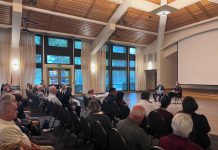“Some people believe football is a matter of life and death. I’m very disappointed in that attitude. I can assure you it is much, much more than that.”
– former Liverpool coach Bill Shankly
Election results? Housing policies? Nah. Only soccer is on my mind today, as I have waited for three years, 11 months for the first game of the World Cup football (read: soccer in American) tournament that comes around every four years. For the next month, though the games may be tape delayed for Pacific time viewers, I will set my alarm so I can watch the early morning games broadcast live.
I met my husband at the World Cup in Spain in 1982. Reagan was president, England had invaded the Falklands and American soccer was just a cushy haven for aging European stars in the twilight of their careers. The morning after our arrival in Barcelona, we had to pick up our game tickets at a business site uptown. Although no one else was ready to walk to find this place, down the stairs bounded the man of my dreams (though I didn’t know it until two weeks later), knapsack over his shoulder, cheerfully saying “who’s ready to go?”
Later that night, we saw our first game at Nou Camp stadium, newly built to seat a staggering 100,000, compared to the smaller venues that crammed half that many.
On the way to our seats in the seagull section, Europeans and Latin Americans derided those of us who carried American flags, taunting “what are you doing here? You can’t play soccer.” But nothing could spoil the elation at our being there in Europe for this event we’d both longed for years to see. We hugged each other, giggling “we’re finally HERE!”
When he noticed how my hair kept blowing across my face, he got up and sat on the other side to block the wind. That, and the fact that he listened to all my opinions on world and local soccer (and I had many) and politics (even more) with all seriousness, not dismissing me as either a groupie or a dyke (which was the common attitude of male soccer players toward women players back then), made me know I’d met a friend for life.
Later, after the Brazilians and Italians stopped dancing in the streets (about 3am), we walked around Barcelona, talking while the streets were deserted by all but the National Police bearing submachine guns. We watched the sun rise over the Mediterranean.
The rest is history. We dated, we married. He coached while I played on sometimes as many as three teams at a time. I hated class and work, but loved the days of practice and games. We kept balls and soccer cleats in the car, ready for pick-up games with friends on off days.
The shared passion for soccer developed into a shared passion for our family. I quit playing soon after my daughter was born, no longer wanting to drive all over the Bay Area every Sunday morning. He later coached our daughter’s team, where he treated them as if they were as capable and worthy as any boys team.
We always thought we’d be a soccer family. But much to our surprise, our kids never felt as compelled to play like we did. My daughter could take it or leave it (and left it). My son, after a season when he was 8, didn’t care to play except with his pals during the school season.
We couldn’t figure it out, until we realized that we needed the game to help us make sense of the world. Here was a game I could play without Amazonian height. It provided structure, rules and roles we embraced and could easily translate into the macrocosm of our daily lives; it provided a nurturing family through our teams. We just couldn’t get enough of it.
In contrast, the kids have other interests that light their fire; theater and music, art and deep friendships and a loving family already.
However, that doesn’t stop me from agreeing with the Liverpool coach, and looking forward every four years to this one month of competition. I cheer this generation of players, while remembering that spectacular summer that changed my life.
This is the world’s game. You can be tall or short, it doesn’t require special clothing, and you can play on any flat surface. It just takes a ball. How can you not love it?
Columnist Dina Campeau is a wife, mother of two teens and a resident of Morgan Hill. Her work for the last seven years has focused on affordable housing and homeless issues in Santa Clara County. Her column will be published each Saturday. Reach her at dc******@*****er.net.







